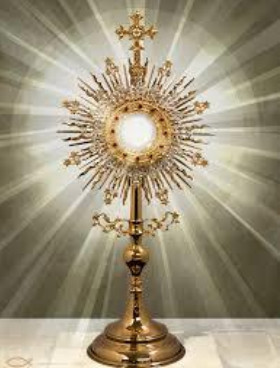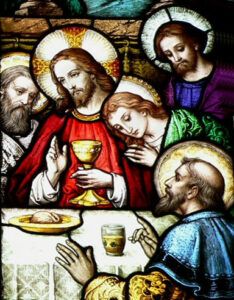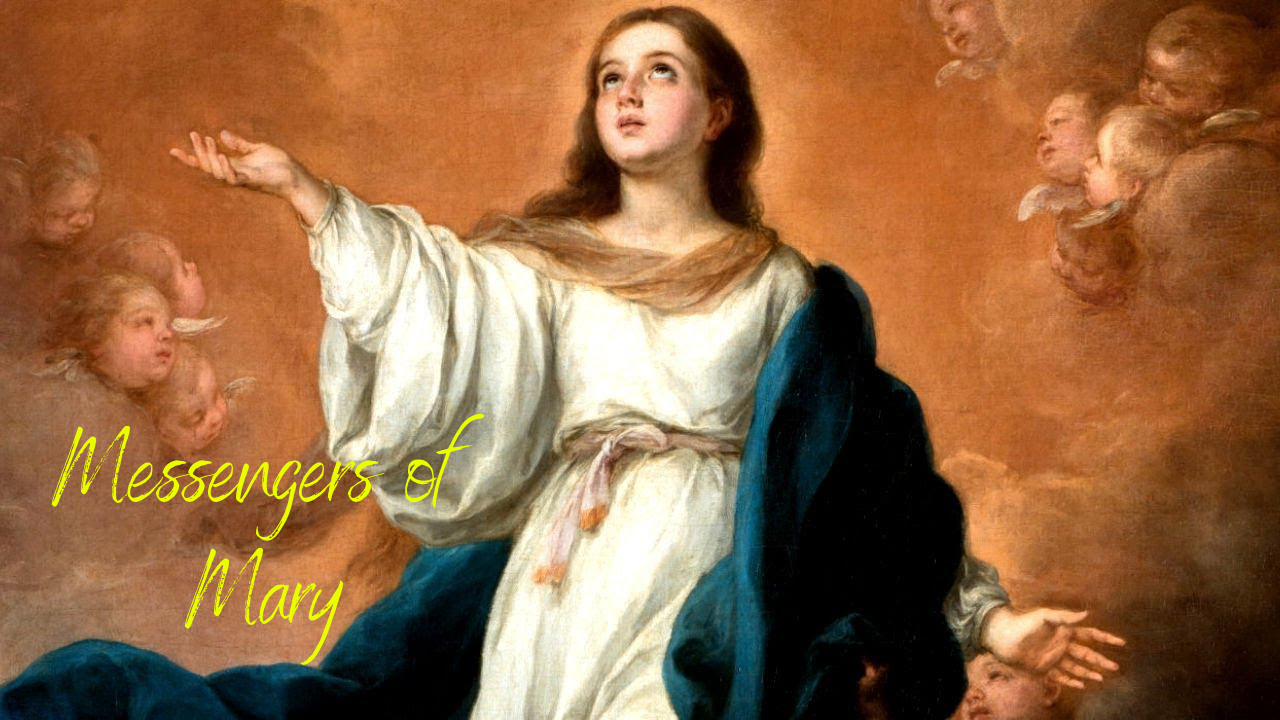
Here we will speak of the wonderful Sacrament of the Altar and how very great this treasure is in our midst. [Taken from Dominic’s Literature, Essays & Manuscripts.]
The Holy Eucharist essentially consists in two things: A) a Sacrament and B) a Sacrifice.
Both the Sacramental and the Sacrificial elements of this mystery were created at the time of their institution by Christ at what is known as the Last Supper.
This Last Supper was also the First Mass. What happened was that Jesus, knowing that He was to die on the Festival of the Passover, celebrated this Feast a day early with His Twelve Apostles.
The Passover commemorates the liberating of the Jewish people from slavery under the Egyptians through Divine intervention and their freedom as a nation under Moses.
Passover means the passing of the Angel of Death over Egypt and those who had the blood of the lamb over their homes were unharmed. Before this Feast there was the seven days fast of the Unleavened Bread.
It is called Unleavened because God told His people to leave Egypt after the Passover before completing the baking of their bread and He instructed them to eat bread that was not yet leavened for seven days in future before celebrating the Feast of Passover or Pasch.
Leavening was a process used to speed up the rising of the bread and it was a form of thickening the bread and improving it with yeast from grape leaves. Leavened bread had a puffy or bulgy texture to it, whereas unleavened bread was thin and wafer like.
The Last Supper & the Eucharist
So Jesus and His twelve disciples met in the dining room of a guest house (the owner of the house seems to have been Nicodemus). Prior to this Jesus had openly preached about Himself being the Bread of Heaven, the food of men’s souls.
But it is unlikely that anyone really understood what he meant or could have guessed the details of His marvellous invention—the changing of bread and wine into His own substance.
He assured His friends that He had been greatly looking forward to sharing this Pasch with them; “with desire have I desired to eat this Pasch with you before I suffer.” (Luke 22:15). This is because He was about to give Himself to them in a very intimate and profound way.

The Holy Eucharist is a Sacrament because it is a visible sign, instituted by Christ to confer grace. It is also a Sacrifice because it is identified with the Sacrifice accomplished by Christ on the Cross of Calvary.
The Sacred Victim is immolated through the double Consecration of the Bread and Wine. This symbolises the separation of Christ’s Blood from His Body in His Passion and Death.
But really, the Host and the Wine, when Consecrated are theologically the same thing; they are both substantially changed into the substance of the Body, Blood, Soul and Divinity of Jesus Christ.
The accidentals (appearance, size, weight, colour, feel, etc.) of the former substances of these Consecrated elements all remain the same; entirely unaltered and hence why an act of faith based on Christ’s authority is required in order to accept the truth of so astounding a miracle.
During the Last Supper we have the Offering of the gifts to God, the Consecration of the elements into the Substance of Christ, the immolation of the Consecrated Offerings and the Communion in which each participant is fed on the Sacred Species.
Christ is not only Sacrificed for us in atonement for sin and for the glory of God, but He is also given to us, entirely and personally as separate individuals through the Sacramental element of the Holy Eucharist. We are given a stronger or more intense influx of grace when we receive Christ in the Blessed Sacrament.
Grace comes to us in the mode called Ex Opere Operato, meaning from the work worked. This differs from Ex Opere Operantis, which means from the work of the doer. We are given grace when we do certain things, such as exercise a particular virtue. But in the case of Holy Communion, it is the Sacrament that produces grace in us of itself and it tends to nourish, feed, strengthen and protect our souls on their spiritual journey.
It is also good for our souls to spend time in Adoration before Christ in the Sacrament of His Love.

Would like to take the wafer daily but no wine just water. Is this a waste of time? Seems like it might be a spiritual communion. Perhaps I’m missing the nourish feed strengthen and protect our souls on their spiritual journey part of a ministry.
Hello Ruben, it is still a perfectly valid and profitable thing to receive Communion under the species of Bread only. Receiving the wine is not necessary in order to receive the graces of the Blessed Sacrament. I hope this is relevant to your question, if not, let us know.